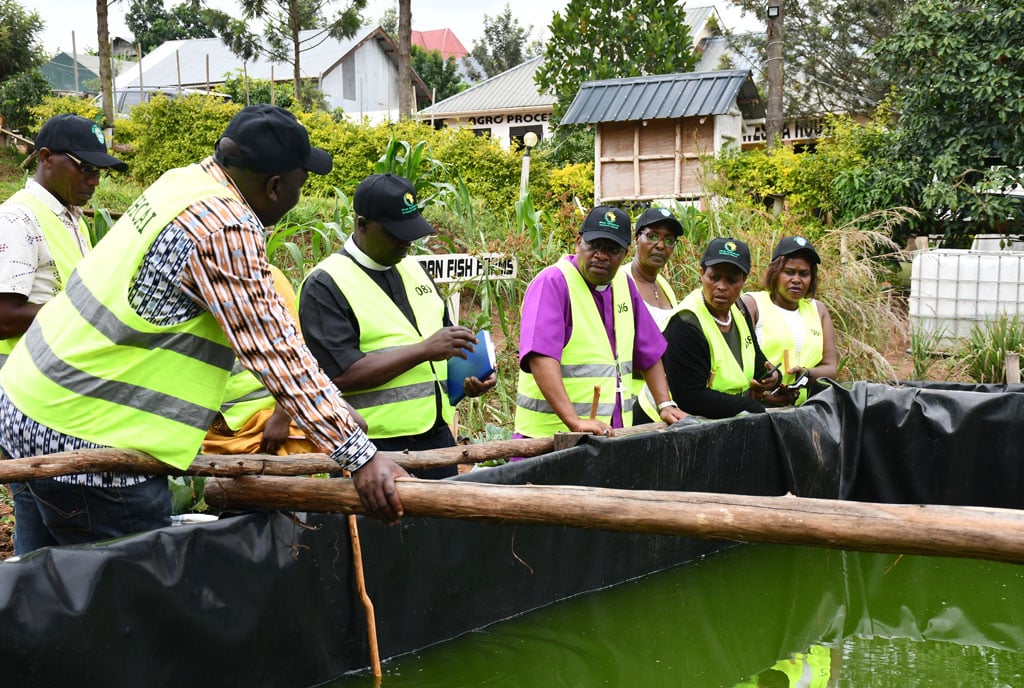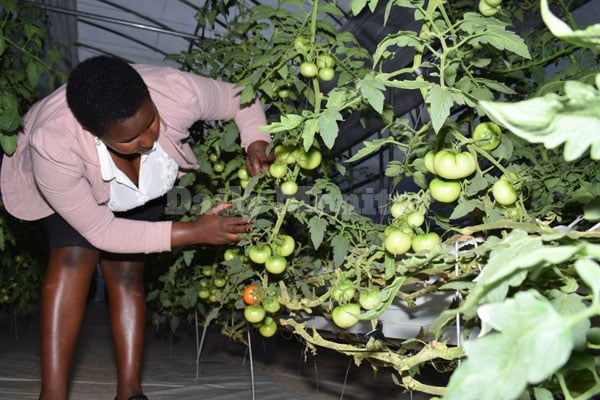Prime
Field visits bridge knowledge gaps

Some of the farmers from Kigezi at the fish section during a farmer field visit at Excel Hort Consult in Biharwe,Mbarara City. PHOTO/RAJAB MUKOMBOZI
What you need to know:
- Field trip visitors learn about the value of farming, experiencing first-hand the production of food from seed to table.
- The primary goal of such demonstrations is to increase farming productivity.
One of the challenges the agriculture sector in the country faces is lack of access to information on modern technologies, skills which has not only affected production but also productivity.
But also, the country faces a challenge of lack of extension workers which also results in low levels of adaptation of modern technologies, limited access to farm inputs, weak linkages to market and financial support. According to the Ministry of Agriculture, Animal Industry and Fisheries the ratio of extension workers to farmers in Uganda stands at 1:1800.
However, one of the ways to bridge this gap is through farmer field visits where farmers get knowledge on farming technologies and techniques and get practical information on some of the best agricultural practices.
Prof Alex Ariho, the director of Excel Hort, an agribusiness incubation hub that also has an agricultural practical and demonstration farm in Biharwe, Mbarara City explains that the farmer field visits help farmers to interact with agricultural experts, research fellows, organisations and fellow farmers.
“Field farmer visits give an opportunity to farmers to share experiences, get technical assistance but also address questions and challenges that most farmers face like crop management, disease control, and market linkages. In a situation where extension workers remain few in the country, farmer field visits concept should be supported,” Prof Ariho explains.
He adds that farmer field visits also help farmers get information, for example on where to get improved seeds, breeds, market and financial linkages.
Prof Ariho also notes there is also still a challenge where researchers and experts just dump innovations and technologies to farmers, which makes it hard for them to adapt, and thus leading to farmers remaining stuck to their traditional way of doing things which are unproductive to drive the sector.
“Some of the experts and researchers seem to be too busy for farmers, and this makes farmers view whatever they tell or bring to them as just stories but with this interaction (farmer field visits) the gap between farmers and experts can be bridged, which will facilitates the easy flow of knowledge, professional guidance and advice, especially to the grassroots and rural farmers,” Prof Ariho added.
Planning
He however notes for farmer field visits to have an impact, they need to be properly planned and executed.
“People now have modern farms and demonstrations but to have an impact on farmers who visit them, these visits need to be properly planned. For example, the farmers need to find knowledgeable and skilled people on your farm, to give them necessary skills and knowledge,” Prof Ariho explained.
He said that for example at Excel Hort Consult, for any farmer field visit you have to make bookings at least within 24 hours to enable them to prepare your visit to have an impact.
“True we have professionals and experts managing our farms but you need to do the booking with us first. This enables to make the necessary preparations, we have partnerships with local extension workers, government entities like Naro, universities and farm institutes around, so most times we engage them to come and give expertise to our visitors,” he explains,
He adds: “Properly planned field farmer visits are key in helping farmers with farming technologies, techniques and practical information from agricultural experts, fellow farmers, and research organisations and equip farmers with skills for increased production and productivity”.
Mr Asaph Mugizi, the chairperson of Uganda Banana Farmers’ Cooperative Union, said farmer field visits can help to bridge the gap between innovators, researchers and farmers.
“That’s why a new crop variety is introduced and is met with a lot of speculation and falsehood resulting in either resistance or reluctance in adapting it. We need to move with these researchers and innovators but not just dump their results to us,” Mr Mugizi.
Hands-on
Mr Atananzio Tumwebaze, a banana farmer from Bubare in Mbarara District, said instead of organising workshops for farmers they should take them for farmer field visits.
“Farmers have no time to read handouts given to them during workshops, they don’t need lecturers but practical skills and I think farmer field visits are the best approach to address the skills gap.
Solution
The essence of farmer field demonstrations empower farmers to learn, understand, and make informed decisions. The approach challenges conventional agricultural extension approaches, which are based on top-down delivery of technology packages.




